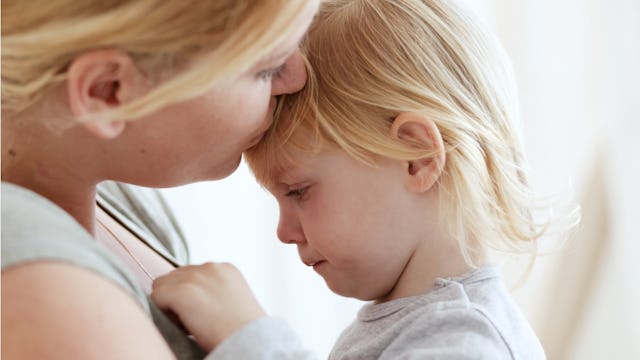This Is How To Help Children Survive Childhood Trauma And Adversity

As someone who experienced childhood trauma, it has always interested me why certain children thrive despite adversity and toxic stress during childhood while others do not. In the back of my mind, I’ve always thought of my single mother — who despite some idiosyncrasies and sky-high stress of her own — was my rock and was part of the reason I ended up being the decently functioning adult I have become.
This sort of thing is something I see often when I look at people in my life who have faced tremendous stresses from childhood — even abusive or neglectful circumstances. Almost all of those who have come through with resilience seem to have had one adult (and not necessarily a biological parent) who has shown them stability, safety, and love.
Well, it seems like there actually is something to my theory.
Researchers from the National Scientific Council on the Developing Child at Harvard University released a report in 2015 that showed just that. The report looked at what the key ingredients were that produced children who thrived despite the unlucky hands they were dealt in childhood, and what they found was that having at least one strong and committed relationship with an adult topped the list.
“Resilience depends on supportive, responsive relationships and mastering a set of capabilities that can help us respond and adapt to adversity in healthy ways,” said Jack Shonkoff, chair of the report. “It’s those capacities and relationships that can turn toxic stress into tolerable stress.”
Here’s how the researchers say it works, from a scientific standpoint: The developing brain of a child relies on something the researchers call “serve and return” between themselves and their caretakers. They explain that when these actions occur regularly and in a healthy manner, the child builds up an arsenal of “key capacities — such as the ability to plan, monitor, and regulate behavior, and adapt to changing circumstances — that enable children to respond to adversity and to thrive.”
Of course, the tragic and depressing aspect to this is that children who don’t have any relationships that offer them this sort of stability are at risk of improperly developed brains and lifelong mental health issues.
“The body perceives the absence as a threat and activates a stress response that — when prolonged — leads to physiological changes that affect the brain and overall systems of physical and mental health,” explains Bari Walsh on the Harvard Graduate School of Education website. “The stress becomes toxic, making it more difficult for children to adapt or rebound.”
Besides having that one stable adult in their life (and the researchers specifically do not say that this person has to be a biological parent or even a parental figure at all), the researchers gleaned a few other interesting pieces of information about kids who thrive despite adversity. These characteristics include having a “sense of mastery” over life’s difficulties and stresses, strong self-regulation skills, and some sort of faith-based or culturally traditional support system.
Although the researchers believe that resilience is partly built by how a child’s internal disposition and genetics react to stress, they believe that resilience can be built by positive circumstances and relationships. Not only that, but there is no expiration date in terms of a child’s ability to acquire a little resilience in their lives. This is very good news because it means being born into the most difficult circumstances does not necessarily mean a child is doomed to a lifetime of pain.
However, when faced with extreme diversity and trauma, almost all children will need professional treatment to heal, say the researchers, which is important to keep in mind if you are the parent of a child who has experienced trauma of any kind.
I think it all boils down to the fact that what children need most — much more than material possessions, social status, picture-perfect lives, or anything else that we parents desperately try to acquire for our kids — is love.
It’s presence. It’s care. It’s just showing up for our children every day with open arms. It’s always bringing love to table no matter what else is happening in our lives.
And that love can come in the form of two biological parents, a single parent, an adoptive parent, or any figure in their life who can commit to loving that child without condition — and for the long-haul.